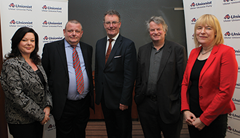Michael Copeland MLA
 UUP MLA Michael Copeland was elected to represent East Belfast in the 2003 Assembly election, lost his seat in 2007 and was re-elected in 2011. He was a member of Castlereagh Borough Council, for Castlereagh Central, from 2001 to April 2013.
UUP MLA Michael Copeland was elected to represent East Belfast in the 2003 Assembly election, lost his seat in 2007 and was re-elected in 2011. He was a member of Castlereagh Borough Council, for Castlereagh Central, from 2001 to April 2013.
Michael is a former director of Modarc Sales, a kitchen furnishing company in Newtownards. He sits on the Public Accounts Committee and the Social Development Committee, and takes a strong interest in housing and welfare reform.
How did your interest in politics come about?
An opportunity presented itself at a time in my life when I felt a need to in some way to repay some of the benefits I had received as a citizen living in this part of the United Kingdom. I very quickly learned the level of self-satisfaction that could be derived by helping others through the holding of this elected office and continue to derive the peace of mind that flows from helping others less fortunate than myself.
I’m not sure that anyone wants to be an MLA as such. Those who grow up seeking a career in elected office are foolish; it can end almost as quickly as it starts. I like to think that my constituents wanted me to become an MLA, rather than the other way around.
Why did you choose the Ulster Unionist Party?
It was the party I always would have voted for. To me they were the national party, and a party who were confident in the union.
Who has inspired you over your career in politics to date?
The ordinary citizen who places confidence in my ability to act on their behalf is my inspiration every day.
What are your aims for East Belfast in this Assembly term?
To provide true representation and support to those who need it most.
What is unique about East Belfast?
The people of East Belfast are comparable to no other. I could use many adjectives to describe them, all of which are positive.
What single issue would you hope to champion in the current Assembly?
The rights of the truly weak and truly under-privileged in the face of big government which cares little for their well-being.
Who have been your major influences within politics?
My wife has been a major influence on my political career. She provides me with advice, assurance, and she certainly does not let me get ahead of myself.
Unionism is often viewed as a conservative movement. Do you think this is a fair description and, if so, how can centre left views be represented more clearly?
The fact that it is often viewed as a conservative movement doesn’t mean that it is a conservative movement. There are many strands to unionism, even within my own party, and I suppose that’s the beauty of it. This perception of ‘conservative unionism’ is part of the problem which we face today. Vast swathes of working class communities are effectively disenfranchised by this stereotype; a stereotype which I prefer not to subscribe to. Every person in Northern Ireland currently benefits from the union, regardless of class, religion or background, and it is this which forms the basis of my unionism.
 What is in most urgent need of change in the Stormont system?
What is in most urgent need of change in the Stormont system?
Stormont needs to start making connections with people on the streets, many of whom see no tangible links with the Assembly. The fact that it’s on a hill is a coincidence but also quite symbolic, as less than a mile away are some of the most deprived streets in Northern Ireland.
I believe an opposition at Stormont could be the single most significant move to improving the performance of the Assembly and Executive. However, given the unique circumstances of Northern Ireland and our history, I cannot see a time when Northern Ireland will not require a cross-community government. Therefore a formal opposition, whoever is in it, could work in opposition to a coalition cross-community government, made up of the largest parties of the two big blocks.
How do you relax outside work?
The company of friends. I enjoy music, I enjoy infrequent holidays, I like to drive, I like meeting new people and I enjoy the company of my grandson. My overriding passion is to champion the underdog and to ensure fair and equal treatment for all.
What have been your main achievements to date as an MLA?
Getting re-elected in May 2011, I felt, was a great achievement amongst tough opposition.
The processes of the Stormont Assembly can be somewhat futile and so I much prefer my work in the constituency. The feeling that one gets when I’ve secured a suitable Housing Executive house for someone, or resolving a personal matter for someone, far outweighs the feelings associated with Assembly debates.





